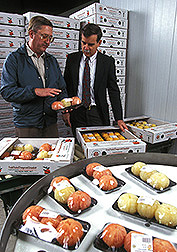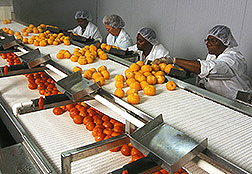Zip-Skinned Citrus
|
|
Mayor Doris Thompson comes in to the office only when something major requires her attention. Most often, the town of Groveland, Florida—population a little over 2,000—is run by a city manager and a 5-member mayoral council.
It takes about 4-½ minutes to drive through Groveland, which typifies Smalltown, USA. "I've lived here since 1949," says James Higdon. "Back then, this was a thriving town, because of the citrus industry. In fact, it used to be called Taylorville, but the name was changed to Groveland because the town's livelihood depended on the citrus groves."
But over the years, successive freezes reduced about 125,000 acres of citrus in Lake County to only 20,000 acres today. Florida's citrus growing areas have shifted south to warmer climes.
There's really no industry in Groveland now. To make a living, most residents drive 30 miles east to Orlando to work in the city. But Higdon works in Groveland.
"For years, I commuted to a job in Vero Beach, about 125 miles away. Now I live a mile from work," he says. Higdon is plant manager for PRE-PEELED FRUIT, INC., located in Groveland. He was hired by Mack Sealy, president of PRE-PEELED FRUIT, to manage the plant that peels citrus with technology the company licensed from USDA's Agricultural Research Service.
"In 1991, we visited ARS' Citrus and Subtropical Products Laboratory in Winter Haven for a demonstration of the process they developed and patented to peel citrus with natural enzymes," Sealy says. "As a result of our visit, we were granted a license to use this technology."
The technology is simple, according to ARS chemist Robert A. Baker. At the Winter Haven laboratory, Baker and Joseph Bruemmer (who retired from ARS several years ago) perfected a technique for using commercially available food-grade enzymes to dissolve albedo—the white, pithy material that keeps citrus peel glued to the fruit.
Baker says that this technique not only extends shelf life for fresh citrus, but it allows the fruit to be peeled without losing any juice or breaking the citrus sections apart. Also, whole fruit that doesn't make the grade for the fresh market because of superficial peel defects can be pre-peeled and still used for fresh consumption.
At the time of Sealy's visit to ARS, the Busbee, Wilkins, and Sealy company was a fruit brokerage firm located in Groveland. After obtaining the exclusive license for the process, Mack Sealy formed a new subsidiary, PRE-PEELED FRUIT, to develop and market enzyme-peeled fruit.
"I'm also a citrus grower, with groves on about 1,000 acres," says Sealy. "I've seen small growers become almost extinct during the past 20 years or so. In addition to giving this town a new business, we're hoping to help some of the local growers by buying their crop."
Built on 40 acres within the town limits, the processing plant encompasses 18,000 square feet and is one of the largest commercial structures in Groveland. Much of the processing and handling equipment was custom made by a food equipment company in the area.
Adding Rural Jobs
When fully operational at harvest times, the new plant could employ about 40 people per 8-hour shift, processing up to 100,000 pieces—about 40,000 pounds of fruit—per shift. And the plant was built with potential to expand. Sealy says that the market has been flooded recently with Ruby Red grapefruit. Local growers in the West Palm Beach area were unable to sell their crops for juice or for fresh consumption.
"We were able to take some of their fruit and run it through our plant," says Sealy. "We then marketed the pre-peeled fruit through local retail grocery chains. They gave us high marks on the appearance and taste of our fruit. Hopefully, we'll be able to continue to help these local, small growers."
He says that citrus has always been treated as fresh produce. "But after our process, the pre-peeled packages of fruit must be treated almost like a dairy product. We give the peeled fruit a shelf life of 18 days, but it must be kept at cool temperatures to preserve the flavor."
Jim Curtis, national sales manager for PRE-PEELED, takes us through the process in the plant. Oranges, grapefruit, tangelos, or tangerines—some purchased locally—are brought into the plant in bins holding about 1,650 oranges or 720 grapefruit. The fruit is placed on a conveyor belt to be washed and sized for uniformity in packing, a standard packinghouse procedure.
Next, the peels are machine scored. The fruit then moves into a vacuum chamber for 3 or 4 minutes, depending on the variety and skin thickness of the fruit, where a vacuum sucks out the gases naturally present in the porous citrus peel.
From there the fruit goes into a bath, at atmospheric pressure. Water and pectinase rushes into the space vacated by the gases. Pectinase is an enzyme commonly used in making jams and jellies.
The fruit then travels through an incubation tunnel for about 25 minutes, while the enzyme breaks down the cells of the albedo.
Finally, it's on to the processing room, where workers remove the loosened peel by hand. "It takes about 6 seconds to take off the peel," Curtis explains.
After peeling, the fruit goes through a hot-water rinse at 140° F, to stop the action of the enzymes, followed by a chlorine rinse to remove any bacteria that might have hitched on. Workers then place the fruit in plastic foam trays, with 3, 5, 6, or 12 pieces of fruit per pack. A packaging machine puts on a stretch wrap, and the packaged fruit is labeled, loaded into shipping cases, and put in a storage room at 35° F.
"We process orders as they are received, instead of storing fruit for 2 or 3 days before processing. This maximizes shelf life for customers. If they keep purchased fruit at between 35° F and 40° F, it will keep for 18 days," Curtis says.
PRE-PEELED wants to target food services like schools, nursing homes, and airlines. Consumers now pay about 40 cents apiece for oranges and slightly more for grapefruit, regardless of size, according to Curtis. A tray of five pre-peeled oranges retails for about $2.29 (45 cents apiece), or from $1.20 to $1.25 per pound; a three-pack of pre-peeled grapefruit costs about the same.
Pre-peeled citrus is now being carried in the Lakeland, Florida, division of the Publix food chain (about 180 stores), in the Tampa division of Winn-Dixie (about 100 stores), and in So Fresh Produce and SuperValu, which purchase for several thousand independent food stores.
Dawn Houser, Director of Food Services for Brevard County, Florida, schools, saw the pre-peeled citrus at a Florida restaurant food show in Orlando. "We're delighted with this product, because we knew immediately that the appearance of the fruit would attract students. Most kids won't bother to peel an orange or grapefruit. Even when we cut fruit in sections, most students won't eat it, because of the mess of the broken juice sacs," she says.
Houser is responsible for healthy menus for 75 elementary, middle, and high schools with enrollments totaling 65,000 students.
"We see the pre-peeled citrus as a way to get requirements for vitamins A and C into our school breakfast and lunch menus," she says. "We offer one cup of two fruits and vegetables daily to our students, and I like to make one of these a fresh fruit. This new pre-peeled citrus will now be our fresh fruit serving."
Curtis can offer the students a half cup of appealing, good-tasting, pre-peeled citrus that can be eaten without any mess, for between 11 and 13 cents per serving.
"I believe this is an excellent way to get kids to eat fresh fruit," Houser says. -- By Doris Stanley, ARS.
USDA-ARS Citrus and Subtropical Products Research Laboratory, 600 Avenue S NW, Winter Haven, FL 33880; phone (863) 293-4133.
" Zip-Skinned Citrus" was published in the May 1996 issue of Agricultural Research magazine.








